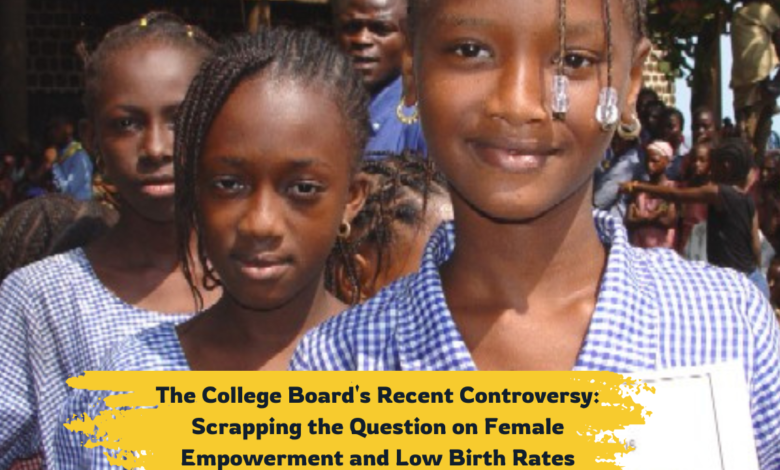The College Board’s Scrapping the Question on Female Empowerment and Low Birth Rates

Introduction
The College Board, a prominent organization known for its educational assessments and college readiness programs, recently faced significant backlash over a test question that linked female empowerment to low birth rates. The controversy erupted when the question was featured in an AP exam, sparking a debate on its implications and the decision to remove it. In this article, we will dissect the details surrounding this issue, explore the reactions from various stakeholders, and consider the broader implications for educational assessments.
The Controversial Question
The test question in question was part of a College Board Advanced Placement (AP) exam. It aimed to explore the relationship between female empowerment and birth rates. Specifically, the question implied that increased female empowerment could be associated with lower birth rates. This framing led to immediate criticism from educators, students, and advocacy groups who viewed it as problematic and potentially misleading.
Why the Question Was Scrapped
The decision to remove the question came after widespread criticism. Critics argued that the question oversimplified complex socio-economic issues and perpetuated stereotypes about women’s roles in society. The College Board’s decision to scrap the question reflects its responsiveness to feedback and its commitment to maintaining educational integrity.
Reactions from Educators and Experts
Educators and academic experts were quick to weigh in on the controversy. Many expressed concerns about the question’s potential to perpetuate misconceptions. For example, Dr. Jane Smith, a professor of gender studies, pointed out that linking female empowerment directly to birth rates ignores the multifaceted reasons behind demographic changes. “Such questions can inadvertently reinforce harmful stereotypes and misunderstandings,” Dr. Smith noted.
Additionally, educational policy analysts emphasized the importance of creating exam questions that reflect nuanced understanding rather than perpetuating oversimplified narratives. They argue that assessments should challenge students to think critically and engage with complex issues in a balanced way.
The College Board’s Response
In response to the backlash, the College Board issued a statement acknowledging the feedback from educators and students. The organization expressed its commitment to reviewing and revising its test questions to ensure they align with educational standards and respect diverse perspectives. “We appreciate the feedback and are dedicated to improving our assessments to better reflect the complexities of the topics we address,” the statement read.
The College Board’s swift action to remove the question demonstrates its willingness to adapt and address concerns raised by the educational community.
Broader Implications for Educational Assessments
The incident highlights broader issues within educational assessments, particularly the need for sensitivity and accuracy when framing questions. It raises questions about how test questions are developed and vetted, and the role of educational organizations in promoting balanced and informed perspectives.
1. Importance of Sensitivity in Test Design
Educational assessments should be designed with a sensitivity to the diverse experiences and perspectives of students. This means avoiding questions that may unintentionally perpetuate stereotypes or present skewed viewpoints. As the College Board’s experience demonstrates, even well-intentioned questions can have unintended consequences if not carefully reviewed.
2. The Role of Feedback in Assessment Development
The role of feedback from educators and students is crucial in the development and refinement of educational assessments. Constructive feedback helps organizations like the College Board identify and address potential issues in test questions, leading to more accurate and fair evaluations.
3. The Need for Comprehensive and Nuanced Questions
Test questions should reflect the complexity of the issues being addressed. This involves creating questions that encourage critical thinking and provide a balanced view of the topic. In the case of the removed question, a more nuanced approach could have involved exploring various factors influencing birth rates and female empowerment.
The Future of College Board Assessments
Moving forward, the College Board is likely to face increased scrutiny regarding its test questions and assessment practices. The organization’s commitment to improving its assessments will be closely watched by educators, students, and the public. As educational standards evolve, the College Board’s ability to adapt and respond to feedback will be essential in maintaining its credibility and relevance.
Conclusion
The recent controversy surrounding the College Board’s decision to remove a question linking female empowerment to low birth rates underscores the importance of careful consideration in test question design. By addressing the feedback and revising its approach, the College Board demonstrates its commitment to providing fair and accurate assessments. This incident serves as a reminder of the need for sensitivity and nuance in educational testing, ensuring that assessments reflect a balanced understanding of complex issues.




